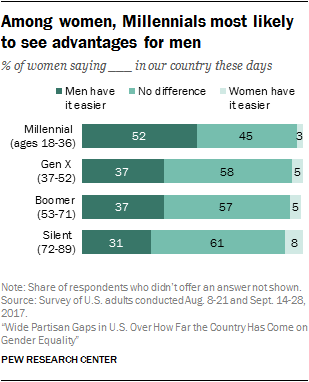In spite of the gains
The findings of a recent Pew Research survey on gender equality contain this observation: “In spite of the gains women have made in the labor force in recent decades, today’s young women are no less likely than older generations to say the country has more work to do in bringing about gender equality. And Millennial women are significantly more likely than Generation X, Baby Boomer or Silent Generation women to say that men have it easier than women these days.”
If I’d had to guess in advance, I would have expected different results. 57% of women overall say the country hasn’t gone far enough in giving women equal rights, according to the survey. Why do a higher proportion of younger American women feel the least progress has been made? The recent outings of powerful men as serial sexual harassers and the devastating scale of #MeToo seem to prove how far we have to go. They vindicate the Millennials’ responses to this survey, though that’s far from a good thing. However, it still doesn’t explain the differences in opinion by age. What does? A hypothesis:
We were told it had been solved. We were told we could grow up to be whatever we wanted. We watched as women shattered glass ceilings to become Supreme Court justices, astronauts, and Oscar-winning film directors. We were told that progress was inevitable, that the gender pay gap would disappear, that we would have equal access to healthcare, that we had the right to jurisdiction over our own bodies. We were told we could have relationships based on mutual respect, consent, and shared responsibilities. We were told that within our lifetimes we would see a female president. We believed those things. We still hope one day they will be true.
And yet. Yet when we become artists, engineers, economists, or historians – not to mention hotel housekeepers – we find men who inhibit our advancement or place little value (monetary or otherwise) on our work. Yet we continue to be patronized, interrupted, harassed, assaulted. Yet we continue to be told we are biologically ‘different’ (read: inferior), too emotional, too bossy, too shrill, too ambitious. Yet we are told to smile, to be nice, to accommodate, to soothe men’s fragile egos, to ease their fear at the thought that they (horror of horrors) might have to share housework or defer to a female boss. Yet we do not see ourselves well represented in a popular culture that supposedly includes us. Yet we cannot move through public spaces without fear. Yet we have to argue for our very humanity, over and over and over again.
None of this is new. Many others have said it before, and more eloquently. Read Rebecca Solnit, Chimamanda Ngozi Adichie, Amanda Hess, Roxane Gay. For that matter, it’s been said for centuries. Read historians Mary Beard, Laurel Thatcher Ulrich, Alice Kessler-Harris.[1] But that’s exactly the point. Women have never been silent; we have been silenced.
At its most extreme silencing takes the form of violence, including rape and murder.[2] It also encompasses threats and trolling on social media. In these instances women who made their voices heard paid a high price for it. On an everyday level silencing tends to take the more mundane forms of comments that reduce women to body parts rather than acknowledging our character or the content of our speech. That speech gets interrupted or ignored entirely, when it’s even considered part of the conversation in the first place (see: ‘manels’). The end result is, as comedian Jo Brand recently spelled out – with admirable patience – to male BBC panelists, “for women, if you’re constantly being harassed, even in a small way, that builds up and that wears you down.”
Not wanting to be worn down seems a reasonable request. Feminism is not, and never was, about women ‘replacing’ men or seizing power. It is about equality. That is literally the dictionary definition: belief in and advocacy for “the political, economic, and social equality of the sexes.” It is called feminism because women have for too long borne the burden of gender inequality. Feminism is about women having seats around the table and our voices being heard. Note that it’s a round table: More people need seats? Get more chairs and a bigger table. No one ends up on the floor.
Do men today have it easier? Yes. Is that an irredeemable privilege? No. But to add seats to the table we need awareness in the place of obliviousness. We, as a society, need to acknowledge the problem. We need to listen to women. We need to believe their stories. We need to do better. And for that we – men and women – need feminism. Bring on the next wave.
[1] There are many, many more fantastic female writers. Those listed here have all written extensively on the subject, far too many to itemize in a footnote: look them up and start reading. Another good place to start is the “Rape Culture Syllabus” put together by Laura Ciolkowski for Public Books: http://www.publicbooks.org/rape-culture-syllabus/
[2] Rebecca Solnit, The Mother of All Questions (Haymarket Books, 2017). The essay “A Short History of Silence” addresses many forms of silencing, including the ways in which rigid gender roles silence men – telling them not to express emotion, or only certain emotions, and denigrating any behaviors seen as too feminine.
